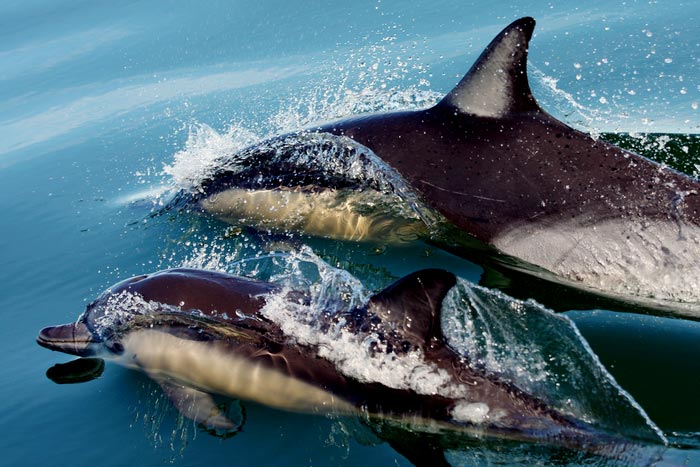First major dolphin DNA study

Five populations of common dolphin (Delphinus delphis) were studied by Flinders University marine biologists.
Photo courtesy CEBEL, Flinders University
Seascape genomics insights to key Australian populations.
The first widespread census of the genetic diversity of common dolphin (Delphinus delphis) populations living along 3000km of Australia’s southern coastline has raised key pointers for future conservation efforts.
The comprehensive Flinders University study calls for more conservation and policy efforts to preserve adaptive DNA diversity and assist connectivity between these dolphin groups. This will support long-term gene flow and adaptation during ongoing habitat changes – including oceanic conditions affected by climate change and human enterprises.
Flinders University researcher Dr Andrea Barceló – first author in the study just published in BMC Ecology and Evolution – says high levels of genomic variation can play an important part in the long-term survival of these wide-ranging marine mammals and other species.
“Information about how the environment affects DNA diversity of marine populations can assist with the population management and in forecasting how they may cope with climate change and other anthropogenic impacts,” says Dr Barceló.
As well, Flinders and Macquarie University researchers say maintaining connectivity can promote long-term genomic variation, which in turn will enhance population viability under anthropogenic impacts, including unfavourable climatic events.
“While so many breeding and feeding conditions are still unknown, it’s important for managers of our coastal environments to consider the importance of DNA diversity, particularly in the event of changes in key environmental conditions such as water temperatures, salinity, and food sources,” adds co-author marine biologist Associate Professor Luciana Möller, from at Flinders University’s College of Science and Engineering.
The adaptive divergence from more than 200 dolphins showed five dolphin populations from Western Australia to Victoria and compared this with the key environmental conditions and available fish food supplies fuelled by oceanic upwellings and local seasonal circulations.
Genomic variation in dolphins of the southern coast of Western Australia was associated to local currents, while genomic differentiation of common dolphins from sites along the continental shelf break was impacted by fluctuations of primary productivity and sea surface temperatures.
I contrast, genomic differentiation of common dolphins from protected coastal habitats and more enclosed embayment areas was associated mainly with fluctuations in salinity and local environment temperatures.
Such seascape genomic assessment identified candidate genes for future comparative studies of common dolphins and potentially other delphinid species that share similar dynamic environments around the world.
The article – ‘Seascape genomics of common dolphins (Delphinus delphis) reveals adaptive diversity linked to regional and local oceanography’ (2022) by Andrea Barceló, Jonathan Sandoval‑Castillo, Chris Brauer, Kerstin Bilgmann, Guido J Parra, Luciano B Beheregary and Luciana M Möller – has been published in the journal BMC Ecology and Evolution (Springer Nature) DOI: 10.1186/s12862-022-02038-1.
Declarations: This study was conducted with animal ethics approval of the Flinders University and Macquarie University under research permit (E326), as well as research permits from Department of Environment and Natural Resources, SA (E25889); Department of Environment and Conservation, WA (SF008961); Department of Sustainability Environment, Victoria (FF383247); Department of Environment, Heritage, Water and the Arts (2008-001) and a state Ministerial Exemption of the SA Primary Industries and Regions (9902404).
Journal: BMC Ecology and Evolution
DOI: 10.1186/s12862-022-02038-1
Method of Research: Survey
Subject of Research: Animals
Article Title: Seascape genomics of common dolphins (Delphinus delphis) reveals adaptive diversity linked to regional and local oceanography’
Article Publication Date: 12-Jul-2022
COI Statement: The authors declare no conflict of interest
All latest news from the category: Ecology, The Environment and Conservation
This complex theme deals primarily with interactions between organisms and the environmental factors that impact them, but to a greater extent between individual inanimate environmental factors.
innovations-report offers informative reports and articles on topics such as climate protection, landscape conservation, ecological systems, wildlife and nature parks and ecosystem efficiency and balance.
Newest articles

Innovative 3D printed scaffolds offer new hope for bone healing
Researchers at the Institute for Bioengineering of Catalonia have developed novel 3D printed PLA-CaP scaffolds that promote blood vessel formation, ensuring better healing and regeneration of bone tissue. Bone is…

The surprising role of gut infection in Alzheimer’s disease
ASU- and Banner Alzheimer’s Institute-led study implicates link between a common virus and the disease, which travels from the gut to the brain and may be a target for antiviral…

Molecular gardening: New enzymes discovered for protein modification pruning
How deubiquitinases USP53 and USP54 cleave long polyubiquitin chains and how the former is linked to liver disease in children. Deubiquitinases (DUBs) are enzymes used by cells to trim protein…



